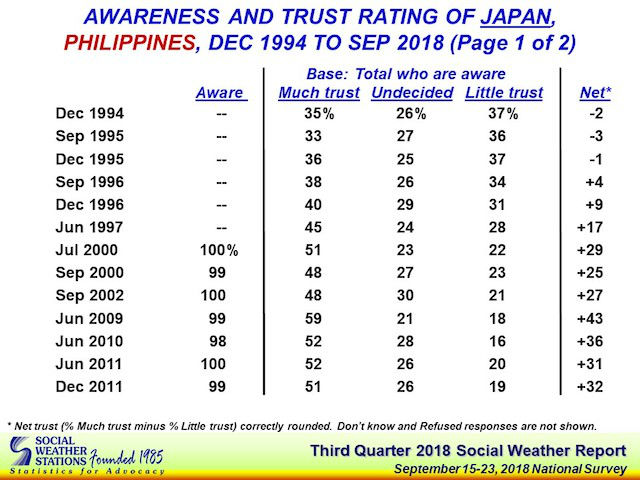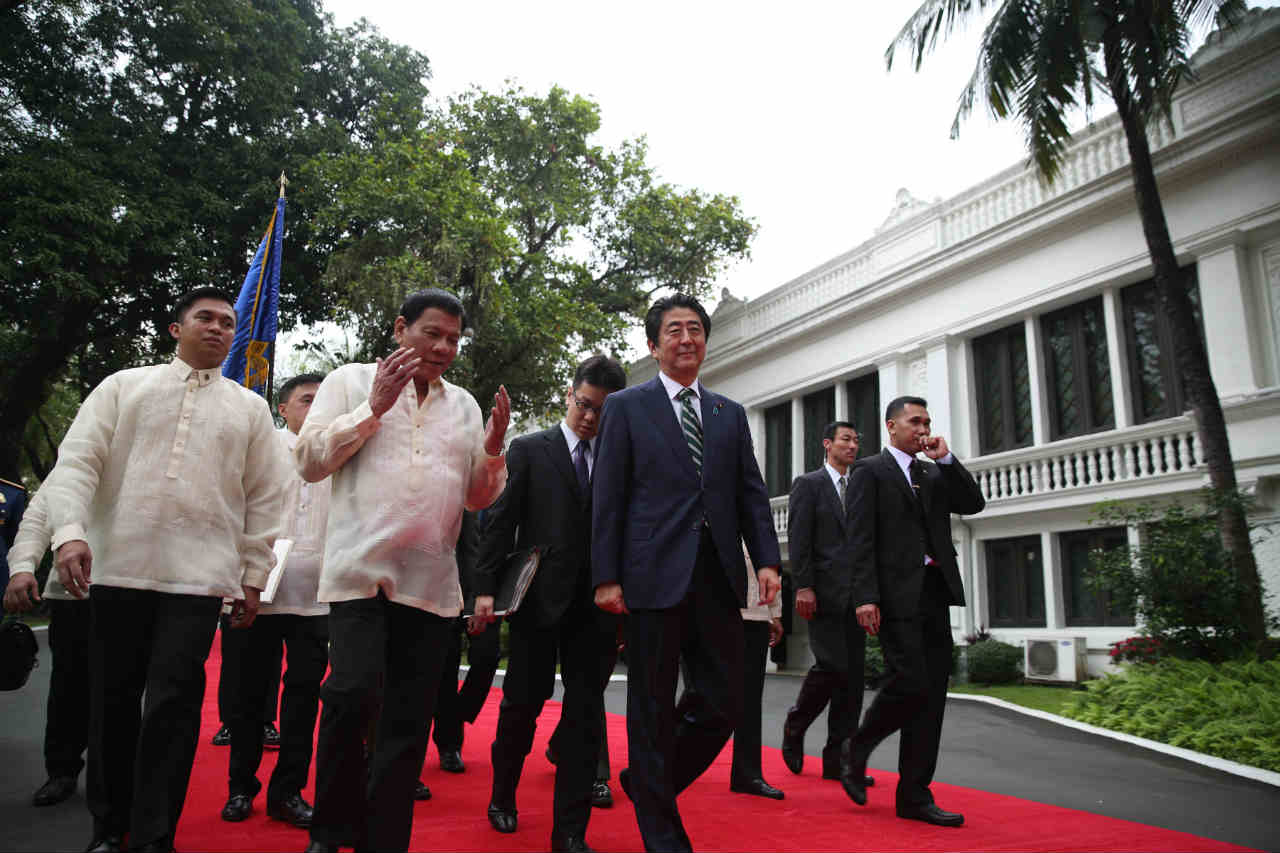

In November, pollster Social Weather Stations (SWS) released its 2018 3rd Quarter Social Survey. Among its findings is increased opposition to government inaction on China's intrusion, the sentiment of 84% of Filipinos.
The surey results also showed that 87% of Filipinos believe it's important for the Philippines to regais control of the islands occupied by China in the South China Sea, and that the US is the most trusted foreign country of Filipinos.
Other than the US, previous iterations of the survey showed that Japan consistently got “very good” trust ratings from Philippine respondents. While the US’ high ranking could be easily explained, Japan as one of Filipinos' trusted countries is quite remarkable.

Cool Japan: soft and hard power
In 2004, international relations scholar Joseph Nye coined the term soft power, which is “the ability to influence the behavior of others to get the outcomes one wants.” Around the same time that soft power explained how the US maintained its hegemony without using its more coercive (military) hard power, Japan suddenly found itself in the limelight of international affairs.
In a 2002 article, journalist Douglass McGray introduced the world to “Japan’s Gross National Cool,” explaining that despite its geo-political and economic misfortunes, Japan’s global cultural influence has grown immensely. It has become a cultural superpower: Cool Japan was born.
In 1994, Japan had a trust rating of -2. This was when war memories were regularly recalled in Philippine history classes and Japan was seen as a migrant destination for entertainers where sensationalized stories abound, such as the controversial death of Maricris Sioson.
By 2000, Japan already enjoyed a rating of +29. Just as the Japan Foundation began to promote Japanese studies, language, and traditional arts, the early 2000s saw the Anime boom. This led to the growth of cosplay, the sudden increase of Japanese language learners, and the rapid growth of Japanese studies programs at the Ateneo de Manila University, De La Salle University, and the University of the Philippines.
Today, we have taken for granted our fascination with Japan, with Filipino tourists’ social media showing selfies under the cherry blossoms, shopping in Akihabara, or visiting the temples of Kyoto.
Japan also promoted the other aspects of its soft power. The MEXT scholarship has produced thousands of Japan-educated scholars and scientists since the 1960s. Japan is consistently one of the highest contributors of Official Development Assistance (ODA) to the Philippines, giving 42% of the total ODA received in 2017, while also being one of the country's top sources of foreign direct investments (FDI).
Since 2006, Japan has been one of the most trusted partners of peace-building in Mindanao. Stakeholders view Japan as an acceptable third party in peace negotiations. Furthermore, Japan is funding major infrastructure projects under President Duterte’s Build-Build-Build program: the PNR South Commuter Line (Tutuban-Los Banos), the Malolos-Clark Rail, the Marawi Rehabilitation program, and the much-awaited Japan International Cooperation Agency (JICA)-funded Mega Manila Subway.
Other than soft power, Japan is central to President Duterte’s equi-balancing strategy. Even as his rhetoric distances the Philippines from the US and attempts to have closer relations with China, Professor Renato de Castro, Philippine international relations expert, describes Duterte as concurrently fostering closer security partnerships with Japan in order to equi-balance with an emergent China.
This is evidenced by Japan’s commitment to transfer maritime reconnaissance planes to the Philippine Navy, the use of Japanese ODA to buy patrol vessels for the Philippine Coast Guard, and joint naval exercises in mid-2015, to name a few.


Reasons for Japan’s untrustworthiness
It is then surprising that the latest survey showed a sudden drop in Japan’s trust rating, falling from an all-time high of +54 last year to the current low of +28. What accounts for this?
First, this is about Soft Power rivalries. It seems logical that as another country’s rating increases, Japan’s rating would decrease. However, soft power is rarely a zero-sum game, where a country’s gain is another country’s loss.
Indeed, the US and Japan’s trust ratings have consistently increased side by side through the years. What about South Korea? While it is seen as a cultural and business rival because of Hallyu soft power that brought massively popular K-pop, K-dramas, electronics, and cuisine to the Philippines, South Korea is not seen as a foreign policy rival. In fact, in spite of historical tensions, Japan and South Korea are staunch allies with the US, aiming to maintain the balance of power against China.
If there is a rival to Japan’s soft power, it is China. As “Charm Rivals,” they have been competing to bring Southeast Asia into their political influence. Other than the promise of infrastructure projects under the Belt and Road Initiative (BRI) and financial lending through its Asian Infrastructure Investment Bank (AIIB), China has expanded its cultural and educational campaigns. Since 2007, it has opened 3 Confucius Institutes and increased the number of secondary schools offering Chinese language classes across the Philippines.
However, Chinese trust ratings have been consistently in the negative since the survey started, with the 2018 survey showing a trust rating of -16. Soft power rivalry, while plausible, does not explain everything. A second explanation is about public relations campaigns.
Perhaps Japan hasn’t promoted its initiatives as much as it should? I would argue that public relation campaigns or lack thereof, could explain the rate by which trust ratings increase but does not offer a real explanation why trust ratings decrease. What then is the most plausible explanation?
Politics of historical remembrance
Although arguably the most devastated country in Southeast Asia after the war, the Philippines was one of the first to reconcile with Japan in a meaningful way.
In 1953, President Quirino publicly forgave and pardoned 52 convicted war criminals. In 1974, while Prime Minister Tanaka experienced massive protests during his state visits to Indonesia and Thailand, the Philippines welcomed him with a parade of Japanese flag-waving Filipinos. These events, together with our mutual geo-political and economic interests, seem to suggest that we have accepted Japan’s apologies, received compensation through ODA, and truly forgiven Japan.
However, this narrative of forgiveness was shattered in April 2018, when the recently built Comfort Women statue along Roxas Boulevard was removed, ostensibly to repair the drainage system near the statue. While the statue’s removal might have been removed in order to avoid embarrassing Japan, we should note that having a comfort woman statue does not necessarily mean that the Philippines is politicizing its historical past in order to demand further apologies and compensation.
Rather, memorial sites should be seen as public spaces where people recall their shared past. Indeed, this event seemed to reiterate that we have not fully resolved our wartime past. While the comfort women statue controversy was neither given much coverage in TV and social media, nor did politicians raise it as a political agenda, this event seems a plausible explanation behind the decrease in trust rating.
Fickle nature of soft power
The previous explanations may not completely explain the drop in trust ratings. Indeed, some of Japan’s projects have its critics and some of our bilateral agreements are still contentious. However, we should look at the bigger picture: Japan is still the most trusted Asian country among Filipinos.
If there is one lesson to be learned from such surveys, it is that soft power is only one facet of international affairs. In the 2014-2018 BBC Country Poll, other countries trust Japan, but not in the same level as other middle powers such as the UK, France and Germany. When we talk about soft power, we should return to its original intention: the ability to attract other countries that lead to policy outcomes.

Even as Japanese trust ratings have dropped, if its foreign policy goals in the Philippines coincide with our national interests, then this is not a problem. Soft power is not about popularity for popularity’s sake. Japan exerts its soft power to become a strategic partner that balances against a rising China.
Since soft power is fickle, then there is no need to overreact. Japan should maintain its course: have a good mix of hard and soft power, increase scholarships, strengthen security cooperation, and above all, continue to make its geo-political interests coincide with ours. Perhaps a few more visits by Prime Minister Abe, highlighting Japan’s commitment for lasting peace in Mindanao, and a roadshow of the JICA-financed subway system will be enough to change Filipino perceptions.
We have to remember that, if given the chance, most Metro Manila commuters prefer to ride the LRT 2 rather than the LRT 1 or MRT 3. Why? Because the LRT 2 was built by Japan. Whether this is a fair assessment is debatable, but if you are a commuter, you know what I mean. – Rappler.com
Benjamin San Jose, PhD is an assistant professor from the Japanese Studies Program and Department of Political Science at the Ateneo de Manila University. He is currently doing research on the changing policy trends of Philippines-Japan migration and Philippines-Japan relations. Comments are welcome at: bsanjose@ateneo.edu